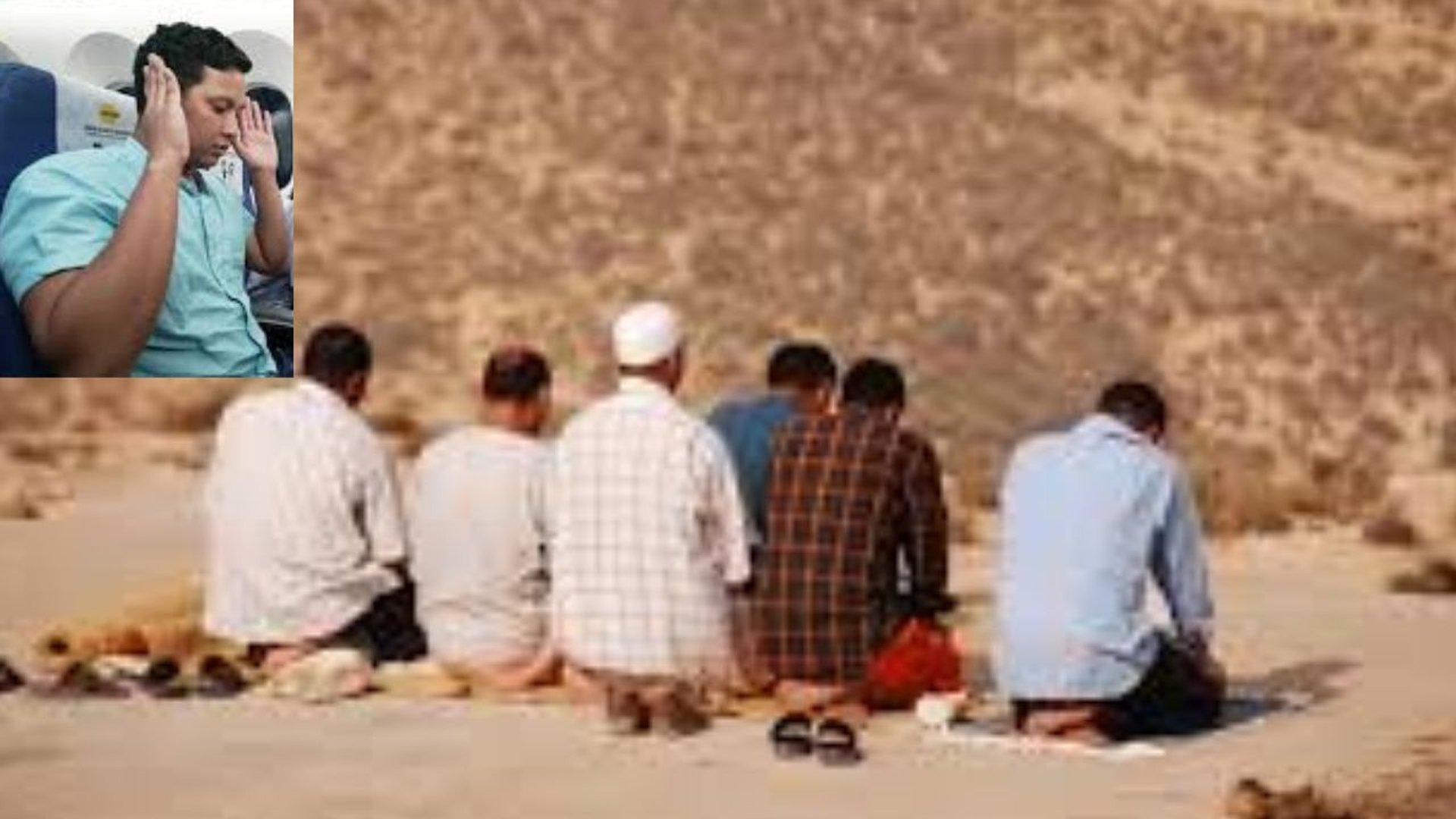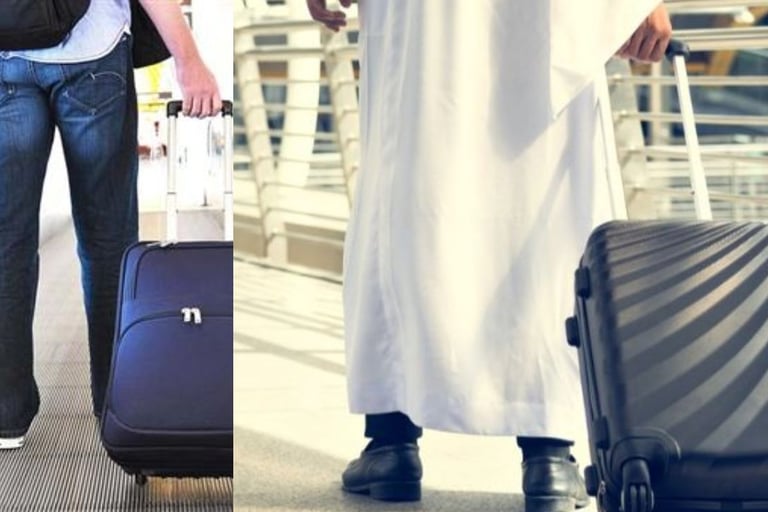
Health is a crown on the heads of the healthy that only the sick can see.

🤲 Shortening and Combining Prayers for the Traveler (Qasr & Jama'u) 🕌
🕌Discover the rulings for shortening (qasr) and combining (jama'u) prayers for travelers
GENERAL
Dr Hassan Al Warraqi
8/19/202512 min read


🤲 Shortening and Combining Prayers for the Traveler (Qasr & Jama'u) 🕌
🕌Discover the rulings for shortening (qasr) and combining (jama'u) prayers for travelers
including the opinion of Ibn Taymiyyah, along with a clear explanation of the difference between qasr and jama'u, travel conditions, and key jurisprudential issues in an accessible, SEO-friendly way.
Fundamentals of Travel Prayer Concessions
Islam mandates prayer as a pillar and obligation, yet divine mercy grants concessions to travelers to lighten the burden.
Main concepts:
Qasr: Shortening the number of rak‘ahs in certain obligatory prayers.
Only the four-unit prayers (Dhuhr, Asr, ‘Isha) are shortened to two units.
Fajr (2 rak‘ahs) and Maghrib (3 rak‘ahs) remain unchanged.Hanafi view: Qasr is obligatory.
Shafi‘i, Maliki, Hanbali: It is a confirmed Sunnah.
Prophetic hadith:
"Allah has relieved the traveler of fasting and half the prayer." (Authentic chain)Jama'u (Combining Prayers): Performing two prayers together within one prayer time.
Dhuhr + Asr may be combined.
Maghrib + ‘Isha may be combined.
Fajr cannot be combined with any other prayer.
Methods:
Advanced combination (Jama' Taqdim): Praying the second prayer in the first prayer’s time.
Delayed combination (Jama' Ta’khir): Delaying the first prayer to be prayed in the second prayer’s time.
Majority of scholars (Shafi‘i, Maliki, Hanbali): Both methods are valid for travelers.
Hanafi & some early jurists: Only allowed during Hajj at Arafah and Muzdalifah; otherwise, only delayed combination is permitted.
Ibn Taymiyyah’s Position on Shortening the Prayer
Essence is one’s travel status, not number of days away:
As long as a man is away from his hometown and hasn't made the new place his permanent residence, he’s considered a traveler—regardless of duration.
Staying in another city for temporary issues (treatment, business, study, etc.) while intending to return means you remain a traveler and may continue to shorten/ combine prayers.
If settling permanently, you become a resident and must pray fully.
Contrasts with the majority who specify a fixed duration (like 4 or 15 days),
but Ibn Taymiyyah considers evidence stronger for maintaining traveler status so long as you intend to return, matching the practice of the Prophet's companions who would shorten even for lengthy stays unless settled.
Practical Example:
If someone leaves his city for medical care and stays elsewhere for a month, as long as his intention is to return, he remains a traveler per Ibn Taymiyyah and is eligible for qasr and jama‘u.
Conditions for Prayer Concessions
Travel Distance:
Most scholars agree the journey must span at least approx. 88.7 km (55 mi), with some minor differences in calculation.Duration of Stay:
Majority view: Less than 15 days.
Shafi‘i/Maliki/Hanbali: Less than 4 days (excluding arrival/departure).
If staying longer, the individual must complete full prayers.
Purpose of Travel:
Shafi‘i & Hanbali: Travel must be for a lawful and positive reason—not to commit sin.
Hanafi & Maliki: Valid regardless of travel's purpose.
Leaving City Limits:
The journey (and thus qasr/jama'u) formally begins after exiting the city/town’s built area.
Underlying Wisdom & Spiritual Intent
Ease and Mercy:
These concessions are not based solely on physical hardship, but arise from divine generosity and the core Islamic principle that Allah wishes ease for you.The Prophet ﷺ said:
“It is a gift from Allah to you, so accept His gift.”“Allah intends for you ease, and does not intend hardship for you.” (Qur’an, Al-Baqara: 185)
The Prophet consistently shortened prayers when traveling—a continuous practice for him and the companions.
Prayers may be combined even for residents in cases of necessity (illness, danger, heavy rain, critical tasks), but should not become habitual.
Practical Guidance & Rules
Intention:
When performing qasr, the traveler should internally intend to offer the shortened prayer at the start.Order of Prayers:
When combining, maintain the prayer sequence (Dhuhr before Asr, Maghrib before ‘Isha).Behind a Resident Imam:
If a traveler prays behind a resident (non-traveling) imam, he must pray the full number of rak‘ahs.Behind a Traveler Imam:
Both the imam and those following (if traveling) pray two; if any local resident follows, they complete their prayer after imam’s tasleem.No Qasr for Sunnah/Nafl Prayers:
Shortening applies only to the four-unit obligatory prayers. Nafl and Sunnah prayers remain unchanged and may be offered if one wishes.Prayer in Vehicles/Airplanes:
If it's impossible to stand or face the qibla, pray sitting, using gestures for bowing/prostration, as Allah commands: “So fear Allah as much as you are able” (Qur’an, At-Taghabun: 16).Making Up Missed Prayer:
Deliberate missing of obligatory prayer is a grave sin. If missed, it must be made up at the earliest opportunity, preserving order.
Combining for Non-Travelers
Hanafi:
Strictly prohibits combination of prayers except in rare emergencies.Some Sunni views (Shafi‘i, Maliki, Hanbali):
Permit combining prayers to relieve hardship (illness, rain, other valid needs), referencing authentic hadiths.
Ibn Abbas:
“The Messenger of Allah ﷺ combined Dhuhr and Asr, Maghrib and ‘Isha in Medina without fear or rain... to avoid burdening his Ummah.” (Sahih)
Popular FAQ on Traveler’s Prayer (Qasr & Jama‘u) - Summary Table
Topic
Ruling/Explanation
When to Qasr/Combine?
Upon leaving city limits for a journey of 88+ km & not planning a long stay
Which Prayers Qasr?
Dhuhr, Asr, ‘Isha: 4→2 units. Fajr (2), Maghrib (3) unchanged
Combine All Journeys?
Yes, for Dhuhr+Asr, Maghrib+‘Isha, if needed; not for Fajr; Hanafi only in Hajj sites
How Long Qasr Lasts?
Majority: <4 days or 15 days. Ibn Taymiyyah: As long as you intend to return
Non-traveler Combination?
Only for genuine hardship/emergency (illness, rain, serious need)
Following Resident Imam?
Must complete the full 4-unit prayers, even as a traveler
SEO-Optimized Keyphrases
How to shorten prayer during travel in Islam
Qasr and jama in prayer for Muslim travelers
Ibn Taymiyyah’s fatwa on travel prayer
Islamic rules for combining Dhuhr and Asr
When is it allowed to combine and shorten prayers?
By Dr. Hassan Al-Warraqi – physician and medical/Islamic knowledge simplification expert at h-k-e-m.com, combining academic expertise and practical vision to provide trustworthy, easy-to-access content for the public and seekers of Islamic and healthcare knowledge.
Frequently Asked Questions about Shortening the Traveler's Prayer (Qasr and Combination)
1. What is prayer, and why is it important in Islam?
Prayer is the second pillar of Islam and a fundamental pillar of a Muslim's faith and constant connection with God.
It is described as a "flowing river" that purifies a person five times a day, washing away their sins and renewing their energy.
Prayer is an obligatory act of worship performed five times a day at specific times (Fajr, Dhuhr, Asr, Maghrib, and Isha), while maintaining constant awareness of and reliance on the Creator.
It is a physical act of worship that involves specific postures (standing, bowing, prostrating, sitting) and recitation, and requires sincerity, humility, and concentration.
Prayer is so important that it is considered the first act a person will be questioned about on the Day of Judgment.
2. What are the basic conditions for the validity of prayer?
For prayer to be valid and acceptable, several conditions must be met:
Prayer time: Prayer must be performed at its specified time.
Purity: Purity of the body, clothing, and place of prayer from apparent impurities (such as urine and blood).
Wudu: For minor ritual impurity (such as sleeping or passing gas), specific parts of the body must be washed with pure water.
Ghusl: For major ritual impurity (such as menstruation or postpartum bleeding), the entire body must be washed.
Dress Requirements: Men must cover their bodies from the navel to the knees, while women must cover their entire bodies except for the face and hands.
Facing the Qiblah: The entire body must be turned toward the Kaaba in Mecca.
Niyyah: The intention for prayer must be sincere and for the sake of God in the heart, not with the tongue.
3. How is prayer performed, and what are its main pillars?
Each obligatory prayer consists of rak'ahs (unit units). The number of rak'ahs varies in each prayer: Fajr (2), Dhuhr (4), Asr (4), Maghrib (3), and Isha (4). Each rak'ah includes a sequence of positions and recitations:
Qiyam: Facing the qibla with intention, raising the hands to shoulder/earlobe level with the opening takbir, placing them on the chest, reciting al-Fatihah, and then reciting another surah.
Ruku': Raising the hands and kneeling, placing them on the knees, keeping the back straight, repeating "Subhana Rabbiy al-Adheem" (Glory be to my Lord, the Almighty) three times. Then, standing, saying "Sami'a Allahu liman hamidah" (Allah hears him who praises Him), and then saying "Rabbana wa laka al-hamd" (Our Lord, to You be praise).
Sajdah: Bowing and prostrating twice, ensuring that seven parts of the body (forehead, nose, palms, knees, and toes) are touching the ground.
During prostration, repeat "Subhana Rabbiy al-A'la" (Glory be to my Lord, the Most High) three times.
Between the two prostrations, there is a short break during which one can pray for forgiveness.
Sitting (Tashahhud and Taslim): After the second prostration of the final rak'ah, the worshipper sits and recites the tashahhud.
In prayers that exceed two rak'ahs, the first tashahhud is recited after the second rak'ah. The prayer concludes by turning your face to the right, then to the left, and saying, "As-salamu alaykum wa rahmatullahi wa-l-salamu alaykum."
4. Why must prayer be performed in Arabic? What are the exceptions for new Muslims or those who find it difficult to learn?
Prayer must be performed in Arabic because it is a fixed form of worship, meaning its form is fixed and cannot be changed based on personal opinion. The Holy Quran, which constitutes an essential part of prayer recitation, is the word of God revealed in Arabic. Any translation is merely an interpretation, with no connection to the sanctity of the original text.
For new Muslims or those unable to learn Arabic, special privileges apply:
They should make every effort to learn Surat Al-Fatihah, as it is an integral part of prayer.
They should also try to memorize the basic Arabic phrases for prayer (such as "Allahu Akbar," .
If they are unable to recite Surat Al-Fatihah in Arabic before the end of the prayer time, they can say: "Subhan Allah," "Al-Hamdulillah," "La ilaha illa Allah," "Allahu Akbar," and "La hawla wa la quwwata illa billah al-'Ali al-'Azim."
Those who find it difficult to learn Arabic should also learn Surat Al-Fatihah and can recite other basic phrases in their native language.
If they have only learned part of Surat Al-Fatihah, they should recite what they know and then complete the rest with tasbih and tahlil.
Praying in congregation is recommended during this stage of learning, as the reward may make up for any shortcomings.
5. What are the general rulings on combining and shortening prayers (qasr and jam') while traveling?
Qasr and Jam'ah
Combining prayers is a concession granted by Allah to travelers to ease their burdens.
Qasr: The four daily prayers (Dhuhr, Asr, and 'Isha) are shortened to two rak'ahs. Fajr (two rak'ahs) and Maghrib (three rak'ahs) are not shortened.
Some schools of thought (Hanafi) consider this shortening obligatory, while others consider it recommended (Sunnah Mu'akkadah).
Combining Prayers: A traveler may combine two prayers: Dhuhr with Asr, and Maghrib with Isha.
This can be done either at the time of combining the early or late prayers.
It is not permissible to combine Fajr with any other prayer.
The general conditions for availing of these concessions are typically as follows:
Travel a distance of at least 77-88.7 km (48 miles) or more from the city limits.
Intend to stay in the destination for less than a certain number of days (e.g., less than 15 days in most opinions, or less than 4 days in the Shafi'i, Maliki, and Hanbali schools of thought).
The purpose of travel should generally be legitimate, although some schools of thought permit it regardless of the purpose.
6. Are there specific rules for combining prayers without traveling, and what is the ruling on praying behind a local imam while traveling?
In general, combining prayers is not permissible for non-travelers except in cases of necessity and acceptable excuses, such as illness, feeling threatened (personal safety, money, or honor), or being busy with a task that cannot be interrupted (such as a student taking an exam or a doctor undergoing surgery).
It should not become a regular habit and should be limited to difficult or inconvenient circumstances.
Some interpretations, particularly among Shiites, consider the Dhuhr and Asr prayers, and Maghrib and Isha prayers, to be combined times, allowing them to be combined even in cases of non-extreme necessity, although praying them separately is preferable.
When a traveler prays behind a resident imam, he must complete the prayer (four rak'ahs) and not shorten it.
This is based on the principle of following the imam and on the Sunnah of the Companions, who completed the prayer behind resident imams while traveling.
If a traveler joins a prayer led by a resident imamIf he only performs the last two rak'ahs, he must complete his prayer with four rak'ahs after the imam's salutation.
7. What are the concessions available to sick people regarding prayer?
Islam permits sick people to pray according to their physical ability, because God "does not charge a soul except [with that within] its capacity.
" Prayer should never be abandoned, even when sick.
If the sick person cannot stand, he should pray sitting.
If he cannot sit, he should pray lying on his side (preferably on his right side, facing the qibla).
If he cannot lie on his side, he should pray lying on his back with his feet facing the qibla.
In cases where bowing or prostration is not possible, he should use head gestures, making the prostration gesture more inclined than the bowing gesture.
If standing is not possible and bowing/prostration is not possible, he should pray standing, nodding his head for bowing, then sitting and nodding his head for prostration.
As is the case for travelers, a sick person may combine the Dhuhr and Asr prayers, and the Maghrib and Isha prayers, if performing each prayer on time causes them extreme difficulty.
8. What is the importance of voluntary prayers (Sunnah and Nafl), and are they affected by travel?
Nafl prayers, including Sunnah and Nafl prayers, have great merit in Islam. They are a way to gain God's love and atone for any shortcomings in the five obligatory prayers on the Day of Judgment.
❓ Is shortening a Sunnah or a concession?
👉 According to Ibn Taymiyyah: Shortening is a confirmed Sunnah that is confirmed from the Prophet (peace and blessings be upon him). It is not reported that he completed the prayers while traveling, so it is always preferable for the traveler.
❓ Is it always permissible to combine prayers like shortening them?
👉 No. Ibn Taymiyyah differentiates between them:
Shortening is a permanent Sunnah for the traveler.
Combining is a concession that is only performed when necessary (hardship, continuous travel, rain, fatigue), and is not the permanent rule.
❓ How long is the travel period during which shortening prayers is permissible, according to Ibn Taymiyyah?
👉 He believes that the important factor is not the duration, but the intention:
If the traveler is absent from his country and has not made the other country his homeland, he is considered a traveler even if he stays for a month or more.
If he intends to settle or makes the place his homeland, he becomes a resident and completes the prayer.
❓ What is the difference between his opinion and the opinion of the majority of scholars?
👉 The majority specify a period (such as 4 or 15 days), while Ibn Taymiyyah believes that the traveler may shorten his prayers as long as he is considered a traveler and has not intended to settle, even if the period is long.
❓ Is it better to shorten prayers with combining them or just shorten them?
👉 The basic principle is to shorten prayers without combining them if there is no need.
👉 Combining them is only permissible when necessary for convenience.
Performing these voluntary prayers is a sign of great virtue and reward. For example, praying twelve voluntary units of prayer daily earns a person a home in Paradise.
These voluntary prayers are distributed throughout the day, often before and after the obligatory prayers.
While traveling, there is no shortening of Sunnah and voluntary prayers. If the traveler has time, he or she may perform these voluntary prayers.
The Prophet Muhammad (peace and blessings be upon him) himself performed voluntary prayers while traveling, such as before dawn, noon, and after sunset.
================================================
-----------------------------------------------------------
Dr. Hassan Alwarraqi – Researcher and writer on Islamic practices and integrative lifestyle guidance, simplifying key rulings such as Qasr and Jama‘u to help Muslims practice their faith with ease while traveling.
https://h-k-e-m.com/-shortening-and-combining-prayers-for-the-traveler-qasr-and-jamau-
🤲 Traveling? Islam makes it easier by allowing Qasr (shortening) and Jama‘u (combining) prayers 🕌 — a mercy that balances devotion with convenience on the journey.
1️⃣ Fiqh/Scholarly
✒️ Among Islam’s travel concessions: Qasr (shortening) and Jama‘u (combining) prayers — a divine mercy to ease worship while on the road.
2️⃣ Practical/Daily
🚗✈️ On your next journey, don’t worry about prayer times! Islam allows Qasr and Jama‘u 🕌 so you can stay connected to Allah with ease and peace of mind.
3️⃣ Short/Social Media
🤲✨ Traveling? Shorten and combine your prayers with ease — Islam’s mercy is with you wherever you go 🕌.
----------------------------------------------------------------------------------------------------------------------
===================================================================================================
#Apitherapy #BeeVenomTherapy #BeeMedicine #HealingWithBees #NaturalImmunity
------------------------------------------------------------
=================================================











Get in touch
Address
Cairo Al Rehab
Contacts
+20 109 405 2056
hassanalwarraqi@h-k-e-m.com
